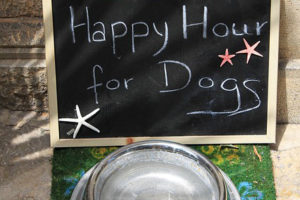Due to the lack of distinctive character, neither fit + fun nor multifit can be protected as a Union word mark. An interesting judgment by the European Court on the distinctiveness of trade marks and on the acquisition of distinctiveness through use.
fit + fun filed as word mark for pet food
 Fitness belongs not only to the Top New Year’s resolution, but also advertising terms with the word component fit are booming. The plaintiff, Multifit Tiernahrungs GmbH (Germany), also saw it this way and filed the word marks “fit + fun” and “multifit” as union word marks in 2016. The application was filed, inter alia, in Nice Classes 5 (Food supplements, dietetic foods for veterinary purposes), 28 (Toys for pets) and 31 (pet food; litter).
Fitness belongs not only to the Top New Year’s resolution, but also advertising terms with the word component fit are booming. The plaintiff, Multifit Tiernahrungs GmbH (Germany), also saw it this way and filed the word marks “fit + fun” and “multifit” as union word marks in 2016. The application was filed, inter alia, in Nice Classes 5 (Food supplements, dietetic foods for veterinary purposes), 28 (Toys for pets) and 31 (pet food; litter).
Both the EUIPO and the Board of Appeal of the EUIPO refused to register the marks. The marks applied for consist of ordinary words which are understood directly by each person. The word ‘fit’, due to its numerous uses for all advertising purposes, is no longer capable of being understood as an indication of the origin of the goods covered.
fit + fun is neither usual nor customary for the goods claimed
The applicant filed an appeal in two separate proceedings for each of the word marks (T:2018:933 ‘fit + fun’, T:2018:936 ‘multifit’), alleging infringement of Article 7(1)(b) of Regulation 2017/1001. The word marks constituted a somewhat original conceptual creation, since the goods covered were attributed human characteristics, the applicant argued. It is neither an indication of quality nor an invitation to buy – nor, incidentally, an advertising slogan. Moreoever Multitfit Tiernahrungs GmbH relied on case-law: the fact that the mark applied for has a positive effect does not prevent it from being protected. Above all, however, the marks applied for are not customary for the goods covered by the trade mark application and are not used on the market by any other supplier. The plaintiff argued that the marks applied for had acquired distinctive character through use.
Due to Originality of an advertising slogan distinctive character?
 The European Court (CJEU) confirmed that trade marks consisting of advertising slogans or indications of quality, if they are not descriptive within the meaning of Article 7(1)(c) of Regulation 2017/1001, may contain a factual statement and may nevertheless be suitable for providing the proof of origin relevant for trademark protection. In addition, the Court has held that the fact that a mark may be regarded as imaginative, surprising and unexpected and thus capable of being remembered does not constitute a necessary condition for establishing the distinctive character of an advertising slogan – but is nevertheless, in principle, capable of conferring distinctive character on an advertising slogan. Therefore, the originality of an advertising slogan must be taken into account for distinctiveness.
The European Court (CJEU) confirmed that trade marks consisting of advertising slogans or indications of quality, if they are not descriptive within the meaning of Article 7(1)(c) of Regulation 2017/1001, may contain a factual statement and may nevertheless be suitable for providing the proof of origin relevant for trademark protection. In addition, the Court has held that the fact that a mark may be regarded as imaginative, surprising and unexpected and thus capable of being remembered does not constitute a necessary condition for establishing the distinctive character of an advertising slogan – but is nevertheless, in principle, capable of conferring distinctive character on an advertising slogan. Therefore, the originality of an advertising slogan must be taken into account for distinctiveness.
In the present case “fit + fun”, however, it is an ordinary advertising message which will not trigger any thought process among the target public, the court ruled. The fact that certain words in complex marks may be perceived differently or may have a more vague meaning does not make such signs distinctive. Furthermore, the fact that a sign is not descriptive does not automatically mean that it is distinctive.
Have the marks acquired distinctive character as a result of the use?
The CJEU also rejected the applicant’s argument that the marks applied for had acquired distinctive character through use, since they were not customary for the goods covered by the application. Actual use of a sign applied for must be assessed only in the context of the application of Article 7(3) of Regulation 2017/1001, the Court held. This in fact allows registration of a mark which is initially devoid of distinctive character where that mark has acquired distinctive character in relation to the goods or services in respect of which registration is sought as a result of the use which has been made of it.
In the present case, however, the applicant has neither relied on Article 7(3) of Regulation 2017/1001 nor claimed use to that effect. Both actions were therefore dismissed in their entirety.
Find more blog articles here on current judgments concerning Union word marks:
- Nov 2018: St. Andrews refused as Unionwordmark for events
- Oct 2018: iGrill no European word mark
- Aug 2018: Descriptive character in a foreign language – trademark registration allowed?
- Jun 2018: SHERPA versus SHERPA: Word mark identical or similar?
Would you also like to protect your brand or trademark?
Then please do not hesitate to contact us. Our patent attorneys and attorneys at law are experienced and highly qualified in all areas of intellectual property law, both nationally and internationally.
Request your call-back without any obligations!
Sources:
European Court T:2018:933 “fit + fun” | European Court T:2018:936 “multifit”
Pictures:
Pavel-Jurca /pixabay.com / CCO License | TaniaVdB /pixabay.com / CCO License








Leave a Reply